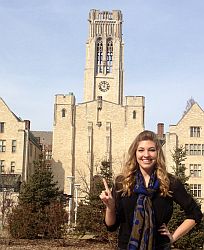
I had been home from the hospital for one day. My dad was tucking me into bed, and it finally hit me. My diagnosis of type 1 diabetes was going to change my life forever. It was the first and only time I’ve seen my dad cry. He didn’t know what diabetes would bring, but, he told me how lucky I was. Diabetes was different from other illnesses because it didn’t hold me back from doing anything I wanted to do in life. I could still run, play, go to school, and become a zoologist (my career aspiration as an 11 year old).
From then on, I knew diabetes would never hold me back. It wasn’t so much a decision to not let it keep me from what I wanted to do in life, but, more so, an acknowledgment and agreement the disease and I had with one another. Believe me, I’ve had (and still have) my bouts of despise with that dirty D-word. Everyone with type 1 has had some type of inconveniences or setbacks due to diabetes, but what matters is how you respond to them. While it’s hard to look on the bright side when you go on a road trip and discover you’ve accidentally forgotten your vial of Lantus at home; but, in cases like these, chain pharmacies can be some of your best friends.
When others discover I have T1D, people are usually pretty shocked because I’m not overweight or do not suddenly pass out in class. There are plenty of stereotypes and misconceptions revolving around diabetes. I felt these more than ever when I went to college. In fact, my roommates thought I was doing heroin when they saw syringes in my room. More than anything, I wish that others could realize that diabetes does not have to be a crippling or debilitating disease. Having diabetes doesn’t mean that you can’t go on an adventure, or do something daring and fun. There are NASCAR drivers and professional cyclists who have type 1 diabetes and don’t let it get in the way of their passion; therefore, neither do I. Sure, it sometimes takes a bit of planning and preparation beforehand, but if you truly love what you are doing, it won’t feel like work at all.
These concepts of passion, planning, and preparation apply to how the University of Toledo Students for Diabetes Awareness (SDA) began. During the first half of my college career, I sometimes found it difficult to find support relating to diabetes. The stress of exams, homework, and my job outside of school sometimes affected my blood sugars even when I thought I had perfectly calculated the amount of insulin I should take. This would have been extremely frustrating if I was the only one in this position. Luckily, I had met a few other T1D’s, and they quickly became my “diabuddies”, people I could count on for support and advice when I was feeling down or had a question they might be able to answer. Talking about diabetes led to theorizing about an official group at the University of Toledo which would promote diabetes awareness, raise funds for the search for a cure, and be a place where anyone could find a good diabuddy or two. These talks eventually materialized into SDA, last year’s recipient of the Parks award for the Most Outstanding New Student Organization.
As an 11 year old, I was the goofy kid that danced in the hallways at school and had a small obsession with Spongebob Squarepants. Never did I believe diabetes would lead to the places I have been, people I have met, and future aspirations I hold. I allowed diabetes to carry me into positivity, rather than outcomes filled with negativity. However, it has really only been in the past few years that this has come about. Since I have opened my mind to the positive aspects that diabetes can bring, my life has been much more fulfilled and accomplished.
My dad always says “Run what you brung,” meaning “you have to work with what you have.” So, that’s exactly what I decided to do. I hope that others with diabetes can do the same until there is a cure for T1D. With that in mind, supporting organizations, like the Breakthrough T1D, is pivotal to completing the necessary research that can prevent any other families from struggling with pharmacies, insurance companies, doctors’ offices, schools, and work.

